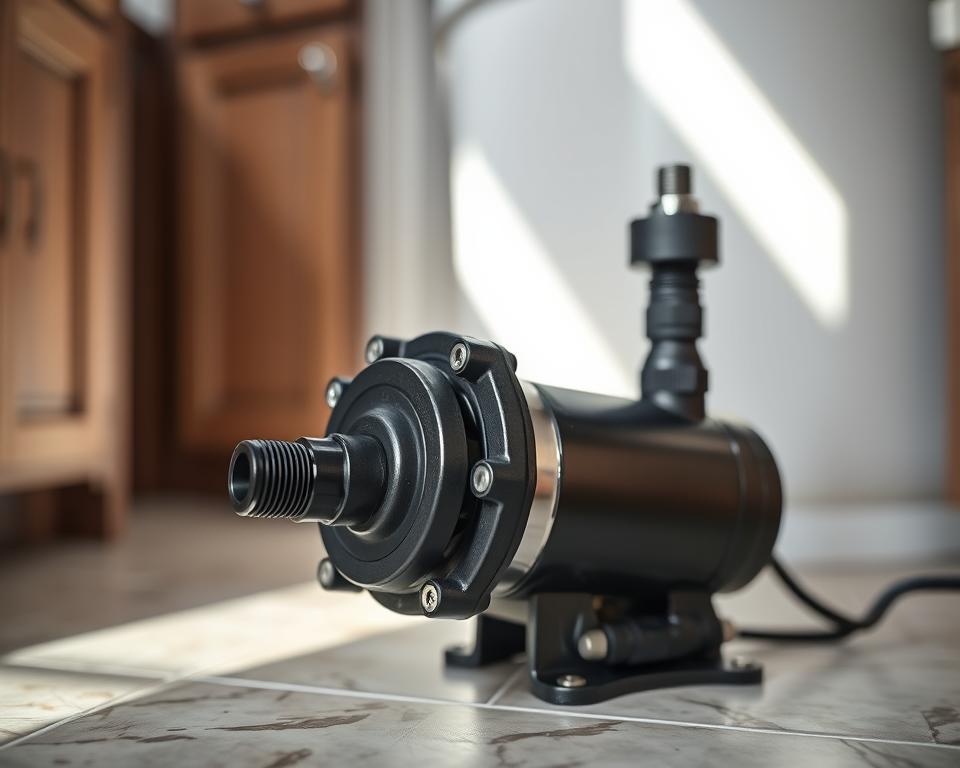RV Sewage Pump: Essential Care Advice
Are you sure your motorhome’s black water pump is fit for the journey, or could it result in campsite headaches? Caring for your motorhome’s waste system in prime condition is imperative. It wards off bad smells, back-ups, and hefty fixes. Below are key advice to guarantee your sewage pump runs without a hitch, keeping your travels stress-free.
Getting to Know Your RV’s Plumbing System
The RV plumbing system is fundamental for any hassle-free adventure. It splits into two main parts: the black water system and the gray water system – pump for RV holding tank. The black water system gathers waste from the toilet, while the gray water system handles wastewater from sinks and showers.
The systems feature drain lines that empty into different tanks, designed for effective waste management. Each tank has a vent to stop gas from building up, keeping the operation is safe and scent-neutral. Proper waste management in an RV is vital to forestall leaks or bad odors. By learning about both black and gray water tanks, RV owners can service and manage waste better.
Knowing how your RV’s plumbing works helps spot issues before they worsen. Scheduled maintenance keeps journeys easier for everyone. Keeping on top with your RV’s plumbing system guarantees reliability during your travels.
RV Tank Categories
Traveling in RVs involves recognizing the different tanks. Each one is essential to your RV’s system, requiring regular upkeep.
The fresh water tank stores cook-and-drink water. It’s indispensable for a pleasant RV experience.
The gray water tank gathers sink, shower, and other non-Septic wastewater. Overseeing this tank keeps your RV clean while traveling. The black water tank, on the other hand, contains toilet waste. It needs consistent emptying and careful maintenance to avoid issues.
By understanding the fresh, gray, and black water tanks, RV owners can effectively manage their systems. This planning and steady maintenance secure smooth functionality of the waste management system.
Black Tank Mechanics
The process of the black water tank is crucial in RV waste management. It receives waste from the toilet via a gravity-fed system. Upon flushing, waste and water are guided toward the tank, to be stored until removal is necessary. It’s critical to keep water levels optimized in the toilet to stop solid waste buildup.
Comprehending how RV waste tanks function can avoid clogs and odors. Without proper care, solid waste hardens, leading to blockages and emptying difficulties. Effective tank flushing techniques are vital to preventing these issues, securing smooth functionality.
Frequent inspection of tank mechanics is advised for RV owners. This includes observing flushing methods and sustaining adequate water flow. Mastering these essentials aids in efficient tank maintenance, averting expensive fixes later.

Key Maintenance Tips for Your RV Black Water Pump
Performing regular maintenance on your RV’s black water pump is critical. Begin with choosing RV-safe toilet paper to cut down clogs and boost flow. A comprehensive flush can clear waste and curb bad smells. Periodically cleaning the tank helps stop residue buildup, keeping your RV fresh and comfortable.
Run periodic inspections to assess your pump’s condition. Inspect for any signs of wear or damage that could reduce its function. Using specialized tank treatments, like those from All in Sanitation, can considerably improve both performance and cleanliness. Adhering to these tips can prolong your pump’s life and upgrade your RV’s living conditions.
Use RV-Safe Toilet Paper
Keeping your RV’s black water system requires key actions. One critical move is using RV-safe toilet paper for clog prevention. This specifically designed product breaks down quickly in water, suited for RV sanitation systems.
RV-safe toilet paper is paramount for tank maintenance. It dissolves fast, avoiding blockages from slow-decomposing materials. This enhances waste disposal efficiency and keeps the plumbing smooth.
Choose brands identified as RV-safe when buying toilet paper. These products minimize clog risks and increase your black water tank‘s lifespan by preventing buildup. Consistent use guarantees a stress-free camping experience, without plumbing troubles.
Proper Tank Cleansing
Rinsing completely your black water tank is key for effective waste management in your RV. To support waste movement, confirm the toilet bowl is sufficiently watered before flushing. Many RVs are equipped with built-in tank flush systems to make the process more effective. For RVs without this feature, attaching tank rinsers that attach to the sewer outlet offers a solid alternative.
Proper tank flushing supports waste removal and wards off solid accumulations and bad smells. Keeping up with this process delivers your RV stays free of odors, making your travels more agreeable. A commitment to regular and complete tank flushing will enhance hygiene and the overall condition of your RV’s plumbing system.
Stop Residue via Frequent Cleaning
Keeping your RV’s black water tank free of buildup is crucial for its peak function. Frequent cleaning gets rid of lingering waste inside the tank walls. This means rinsing well with water and using specific RV tank cleaners for tough deposits.
By cleaning often, you stop odors and cut down clog risks. A well-maintained tank makes RVing better and helps your plumbing last longer. Build tank maintenance into your routine to ensure smooth travels.
Selecting Safe Treatments
Selecting appropriate chemicals for RV black water pump maintenance is essential for managing waste and minimizing smells. Many RV enthusiasts rely on enzyme-based RV holding tank treatments. These products contain good bacteria to degrade solids and curb bad odors.
Avoiding harsh chemicals is critical to prevent damage to your plumbing. Such substances can corrode pipes, leading to expensive repairs and diminishing your RV enjoyment. Utilizing safe chemicals for odor control ensures your tank and pump’s longevity.
Holding your RV black water tank in excellent order betters your travel experience. Using the right holding tank treatment periodically ensures your system works well.
Timely Tank Emptying
It’s vital to empty your RV’s black water tank at the right time for proper dumping. Plan to dump when the tank is about two-thirds full is wise. This sidesteps solid waste buildup, delivering a simpler emptying process.
Disposing waste at official stations is vital for safe, eco-friendly waste handling. It’s essential to watch the tank‘s levels closely. Letting it fill completely can create clogs and make disposal more difficult.
Appropriate scheduling and techniques are key for hygienic waste management and can prolong your plumbing’s life. Staying vigilant and doing proper upkeep guarantees a pleasant RV living experience.
Inspect and Maintain Seals
Reviewing seals around the toilet and tank is critical for leak prevention. Over time, these seals might degrade, leading to odors and potential harm. A thorough inspection will reveal any wear or damage. Detecting issues early makes possible quick replacement to guarantee a secure connection and odor-free RV.
Keeping a bit of water in the toilet bowl assists in preserving seal condition. This protective habit is vital in RV seal upkeep. It increases the seals’ life, halting leaks and foul odors.
Periodic seal maintenance can stop pricey work later. By focusing on seal health, RV owners ensure a pleasant journey.
Long-Term Care Suggestions
Arranging professional servicing for your RV at least once a year is smart, particularly for black water tank care. This strategy helps in spotting issues sooner and preserves your plumbing system’s integrity.
When readying your RV for storage, fully clean and empty the black water tank first. Consider antifreeze to shield against damage from remaining water during cold seasons. Taking this step is important for protecting the system, ensuring it’s ready for your next adventure.
Routine checks and preventive actions are crucial to lengthening your sanitation system’s life. Monitoring connections, hoses, and seals ensures smooth operations. This mindset boosts your RV experience, making it enjoyable all year round.
Ensuring your RV’s black water pump is well-maintained is crucial for a stress-free camping journey. By adhering to the maintenance tips shared, you can keep your black water system functioning well. It’s essential to focus on consistent tidying, applying correct flushing methods, and picking appropriate chemicals for waste management.
By satisfying these maintenance requirements, you will eliminate unpleasant odors and blockages. This also extends your RV plumbing system’s durability. Proactive care of the RV black water pump yields more time enjoying the outdoors, absent potential setbacks.
Don’t forget, proper upkeep is key next time you gear up for an outing. It’s not the highlight of RV ownership, yet it significantly improves your travel experience.


